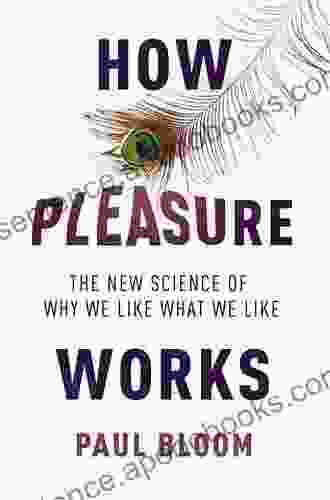The New Science of Why We Like What We Like

In the tapestry of human existence, our preferences form the vibrant threads that weave together the intricate fabric of our individuality. From the music that stirs our souls to the foods that tantalize our palates, the things we like and dislike define who we are and shape our experiences. But what drives these preferences? What unseen forces mold our tastes and desires?
4.1 out of 5
| Language | : | English |
| File size | : | 475 KB |
| Text-to-Speech | : | Enabled |
| Screen Reader | : | Supported |
| Enhanced typesetting | : | Enabled |
| Word Wise | : | Enabled |
| Print length | : | 247 pages |
A Revolutionary Exploration of Human Preferences
In "The New Science of Why We Like What We Like," renowned psychologist Dr. Jonah Lehrer embarks on a captivating exploration that delves into the enigmatic realm of human preferences. Through groundbreaking research and captivating storytelling, Dr. Lehrer unveils the scientific principles that govern our likes and dislikes, shedding new light on the intricate workings of our minds.
Drawing upon cutting-edge neuroscience, psychology, and economics, Dr. Lehrer reveals that our preferences are not merely arbitrary whims but rather the result of complex neurological processes and learned associations. He explains how our brains process sensory information, how our experiences shape our tastes, and how our social interactions influence our choices.
Unveiling the Hidden Architecture of Aesthetic Appreciation
One of the most intriguing aspects of the book is its exploration of aesthetic preferences. Dr. Lehrer argues that our appreciation for beauty is not subjective but rather rooted in universal principles. He demonstrates how certain visual patterns, sounds, and textures trigger specific neural responses that evoke feelings of pleasure and satisfaction.
By understanding these underlying mechanisms, Dr. Lehrer provides a framework for understanding why we find certain works of art, music, and literature more appealing than others. He reveals the hidden architecture that governs our aesthetic experiences, opening up new possibilities for cultivating our tastes and enriching our enjoyment of the world.
Transforming Consumer Behavior and Decision Making
Beyond its theoretical insights, "The New Science of Why We Like What We Like" has profound implications for practical applications. By understanding the science behind preferences, marketers can develop more effective advertising strategies, product designers can create products that better meet consumer needs, and policymakers can craft policies that align with the public's interests.
Dr. Lehrer shows how companies like Netflix and Our Book Library use algorithms to personalize recommendations based on individual preferences. He also explores how our liking for certain flavors, textures, and scents can be leveraged to create more satisfying and engaging food and beverage products.
A Path to Self-Discovery and Fulfillment
Ultimately, "The New Science of Why We Like What We Like" is not just an academic treatise but a guide for self-discovery and personal growth. By understanding the origins of our preferences, we gain a greater awareness of ourselves and our motivations. This knowledge empowers us to make more informed choices about what we consume, how we spend our time, and who we surround ourselves with.
Dr. Lehrer invites us to embark on a journey of self-exploration, challenging us to question our assumptions and embrace new experiences. He shows us that by understanding why we like what we like, we unlock the potential for a more fulfilling and meaningful life.
Praise for "The New Science of Why We Like What We Like"
"A captivating and thought-provoking exploration of the science behind our preferences. Dr. Lehrer's insights are both fascinating and actionable, offering valuable guidance for marketers, designers, and anyone seeking to understand the human psyche."
- Susan Cain, author of "Quiet: The Power of Introverts in a World That Can't Stop Talking"
"A groundbreaking work that revolutionizes our understanding of human behavior. Dr. Lehrer's research provides a roadmap for understanding and influencing consumer choices, making it essential reading for anyone in business or marketing."
- David Ogilvy, founder of Ogilvy & Mather
Free Download Your Copy Today
Embark on this extraordinary journey into the science of preferences today. Free Download your copy of "The New Science of Why We Like What We Like" and discover the secrets to unlocking your own likes and dislikes, making informed choices, and living a more fulfilling life.
Free Download Now
4.1 out of 5
| Language | : | English |
| File size | : | 475 KB |
| Text-to-Speech | : | Enabled |
| Screen Reader | : | Supported |
| Enhanced typesetting | : | Enabled |
| Word Wise | : | Enabled |
| Print length | : | 247 pages |
Do you want to contribute by writing guest posts on this blog?
Please contact us and send us a resume of previous articles that you have written.
 Book
Book Novel
Novel Page
Page Chapter
Chapter Text
Text Story
Story Genre
Genre Reader
Reader Library
Library Paperback
Paperback E-book
E-book Magazine
Magazine Newspaper
Newspaper Paragraph
Paragraph Sentence
Sentence Bookmark
Bookmark Shelf
Shelf Glossary
Glossary Bibliography
Bibliography Foreword
Foreword Preface
Preface Synopsis
Synopsis Annotation
Annotation Footnote
Footnote Manuscript
Manuscript Scroll
Scroll Codex
Codex Tome
Tome Bestseller
Bestseller Classics
Classics Library card
Library card Narrative
Narrative Biography
Biography Autobiography
Autobiography Memoir
Memoir Reference
Reference Encyclopedia
Encyclopedia Juliet Miller
Juliet Miller N C Madigan
N C Madigan Nolan Porterfield
Nolan Porterfield Anita Trehan
Anita Trehan Timothy M Matovina
Timothy M Matovina Donald Trump Jr
Donald Trump Jr Emma Finn
Emma Finn David Peterson
David Peterson Gina Ruffcorn
Gina Ruffcorn D L Martone
D L Martone Cgp Books
Cgp Books Joe Hill
Joe Hill David Marr
David Marr Shawn Wong
Shawn Wong Elie Mystal
Elie Mystal Ty Hutchinson
Ty Hutchinson Elisabeth Mecklenburg
Elisabeth Mecklenburg Anton Sebastian
Anton Sebastian Ashton Applewhite
Ashton Applewhite Nicholas Jacobs
Nicholas Jacobs
Light bulbAdvertise smarter! Our strategic ad space ensures maximum exposure. Reserve your spot today!

 Corbin PowellFall Head Over Heels for the Enchanting World of "Bad Night Stand Billionaire...
Corbin PowellFall Head Over Heels for the Enchanting World of "Bad Night Stand Billionaire... Italo CalvinoFollow ·18.2k
Italo CalvinoFollow ·18.2k Osamu DazaiFollow ·13.1k
Osamu DazaiFollow ·13.1k Javier BellFollow ·5.4k
Javier BellFollow ·5.4k Justin BellFollow ·16.3k
Justin BellFollow ·16.3k Gary ReedFollow ·7.7k
Gary ReedFollow ·7.7k Demetrius CarterFollow ·8.9k
Demetrius CarterFollow ·8.9k Dallas TurnerFollow ·2.5k
Dallas TurnerFollow ·2.5k Rudyard KiplingFollow ·13.1k
Rudyard KiplingFollow ·13.1k

 Julian Powell
Julian PowellShetland Pony: Comprehensive Coverage of All Aspects of...
The Shetland...

 Cason Cox
Cason CoxHow Anaesthetics Changed the World: A Medical Revolution...
Imagine a world where surgery is an...

 Harold Powell
Harold PowellUnleash Your Inner Songwriter: The Ultimate Guide for...
Calling all aspiring songwriters!...

 Nikolai Gogol
Nikolai GogolUnleash Your Artistic Potential: Quick Draw Anatomy for...
In the dynamic and visually...

 Tim Reed
Tim ReedThe Rock 'n' Roll Life of Legendary Sax Man Bobby Keys
The Rock 'n' Roll Life...

 Damon Hayes
Damon HayesMoney Management Activities for Youth: A Guide to...
In an era marked by rapidly...
4.1 out of 5
| Language | : | English |
| File size | : | 475 KB |
| Text-to-Speech | : | Enabled |
| Screen Reader | : | Supported |
| Enhanced typesetting | : | Enabled |
| Word Wise | : | Enabled |
| Print length | : | 247 pages |










